.jpg)
Policy@Manchester at Party Conferences 2025
Each year, Policy@Manchester organise and facilitate panel events at the Labour, Conservative and Liberal Democrat party conferences, offering expertise and evidence on pressing policy topics, showcasing the fantastic academic research from across The University of Manchester on the ultimate policy stage. We have hosted 14 events across the three major conferences this year, on a range of topics from health inequalities, cyber security and school absences. Thank you to all who contributed and attended this year's programme of panel events and discussions.
Campus to Country: How Universities Drive Economic Growth
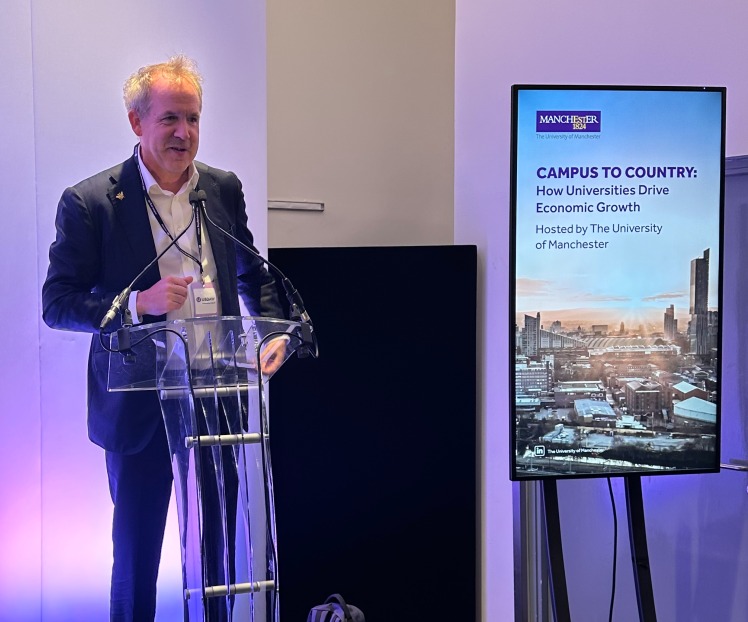
Our Campus to Country reception, hosted at Labour Party Conference, brought together national policymakers, civic leaders and our higher education colleagues to rally for the sector and highlight the vital role that higher education plays as an engine of economic growth. President and Vice-Chancellor of The University of Manchester - Professor Duncan Ivison - opened the event by remarking:
We need to be a university which is both from Manchester but also for the world - civic universities have this unique role to play as deeply embedded in their place, but always looking beyond and opening themselves up to the world.
We were delighted to be joined by Bev Craig - Leader of Manchester City Council - who shared with us her reflections of the civic universities in Manchester, and their role to play in driving economic growth in the UK:
We see today the highest graduate retention rates in the entire country, not just because it's a great city to live in, but because we have created jobs in the nature of the economy that we need to keep people.. at no point in Manchester's story can we disaggregate the role and the relationship that universities have played in that - we wouldn't be able to attract top talent to stay, to spend their time in our city, to live, to contribute - not just to Manchester but to the UK and the world as a whole.
Vivienne Stern, Chief Executive of Universities UK, also joined us for the evening and delivered a fantastic speech championing the work of our higher education sector and her reflections on Manchester:
The reason that The University of Manchester and it's predecessor institutions were founded is because the city needed it - the engine being created around the industrial revolution needed institutions that could power the local economy. These stories keep us focused on what it is that led to the created of the institutions that comprise a rich and diverse sector.
The economic mission of universities is incredibly important, they contribute about a quarter of a trillion pounds to the UK economy every year, and for every pound of public money that is spent in the universities sector, the public purse makes a £14 return.
We are extremely grateful for all who joined us in our rally for the higher education sector - including colleagues from The University of Manchester including , John Holden, Laura Dawson, Dr Luke Munford, and Dr Natalie Bennett - and for Total Politics for their facilitation of this reception.
Left behind neighbourhoods: How do we share Greater Manchester's emerging prosperity?
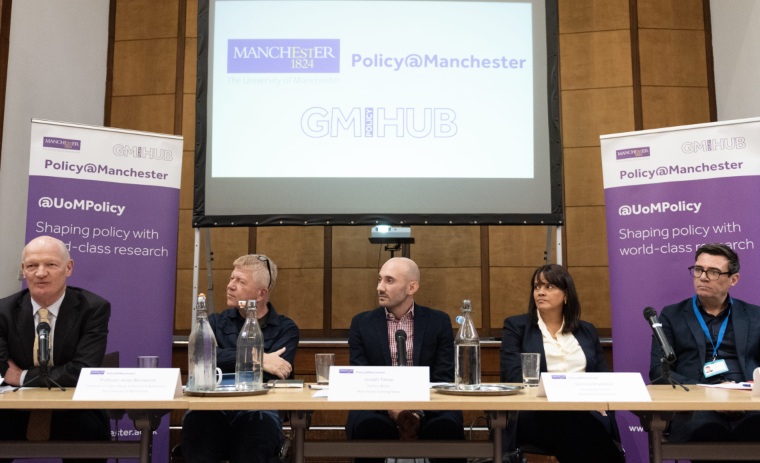
At Conservative Party Conference, we were delighted to welcome Mayor of Greater Manchester, Andy Burnham, to speak at our panel to discuss ways in which we can share Greater Manchester's emerging prosperity. During the discussion, Burnham called for greater fiscal devolution to enable prosperity to be shared across the ten boroughs of Greater Manchester, emphasising his desire to change what he described as an 'unfair' council tax system and laying out his desires to further fund Manchester's transport system - The Bee Network.
Contributing further, Andy Westwood, Professor of Public Policy, Government and Business at The University of Manchester and Policy Director at The Productivity Institute, set the economic picture for Manchester:
Greater Manchester is doing really well, we're outperforming the rest of the UK in terms of the rate of growth, but If you look at Britain’s second tier cities, we underperform quite a lot compared to equivalent second tier cities in Europe and America.
Building on this, Lord David Willetts contributed to the discussion, highlighting his experience as a former Minister of State for Universities and Science and now President of Resolution Foundation. He drew on research from The Resolution Foundation, which shown that agglomeration effects are even better than previously thought for economic performance:
Being close to other people is a massive gain in productivity and performance. The idea that we can spread everything around evenly is not the reality of how economic development is generated. However what we can’t do is have these agglomeration effects centred just in the South East.
Victoria Braddock, Managing Director at Marketing Manchester contributed her insights about what makes Manchester special, highlighting the special role that story telling and emphasising Manchester's history has had in making the city region the success we see today. She referenced the importance of telling the story of our assets, the things we have done to change the world, why we are unique and what has changed in the city - concluding that Manchester has so much to shout about. Finally, we are extremely grateful to our chair for this discussion, Joseph Timan, Politics Writer at the Manchester Evening News for facilitating this important and lively discussion.
Build! Build! Build! Can we solve Britain's housing and infrastructure challenge?
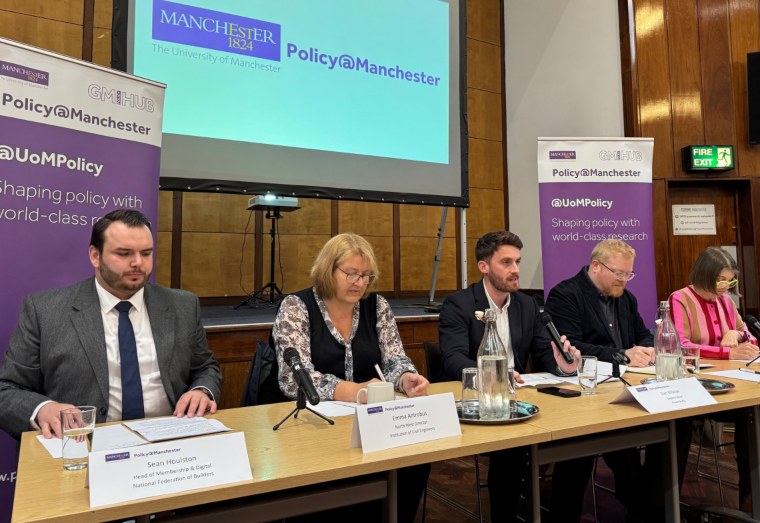
At both Labour and Conservative conference, we were pleased to feature Ian Mell, Professor of Environmental & Landscape Planning at The University of Manchester. Ian's research considers whether grey belts may be the answer to helping the government achieve it's targets of building 1.5 million homes over the duration of this parliament. He also drew on his previous experiences within local authorities to bring a balanced perspective on the challenges around housebuilding and infrastructure projects in the UK:
Planning isn't necessarily the problem - it's the way we communicate ideas, construction and investments - reforming planning isn't a silver bullet, many issues with infrastructure delivery still need to be addressed.
He was joined alongside expert panellists at both conferences, who discussed a range of infrastructure policy themes, from environmental considerations to the contentious nature of the green belt! A massive thank you to all of the expertise and contributions shared during these two panels:
- Chair for Labour Stephen Delahunty, News Editor at Inside Housing
- Chair for Conservative Dan Whelan, Deputy Editor at Place North
- Emma Antrobus AMICE, North West Director at Institution of Civil Engineers (ICE)
- Claire Griffiths, CEO of Cobalt Housing and Chair of Liverpool City Region Housing Associations
- Councillor Jack Shaw, Vice-Chair of Planning Committee at London Borough of Barking and Dagenham
- Sean Houlston, Head of Membership and Digital at National Federation of Builders
- Rachel Maclean, Baroness Maclean of Redditch, Former Minister of State for Housing and Planning
How can mayors improve skills and productivity to drive regional growth?
In partnership with Institute for Government
.jpg)
Regional mayors and combined authorities can drive economic growth through investment in skills, employment, transport and regeneration, and by developing policies to create better jobs, improve connectivity and life labour market productivity. Our panels, chaired by Akash Paun, Programme Director at Institute for Government, brought together expertise and insights about how universities and the higher education sector can support local growth plans. Speaking in his role as President and Vice-Chancellor of The University of Manchester, Professor Duncan Ivison was a strong advocate for the role of civic universities, saying:
We won't have the economic success that the government wants to see unless our cities are firing from all cylinders, and the devolution agenda is a very powerful way to deliver that. Something that has worked well in Manchester is the genuine triple-helix collaborative infrastructure that has been built over the last 20 years, it's unique not just in the UK but globally.
We were delighted to be joined by a range of excellent panellists at both Labour and Conservative conference, who shared their expertise and experiences to explore how further powers and funding should be devolved to enhance the regional growth agenda:
- Alison McGovern MP, the Member of Parliament for Wirral South
- Councillor Bella Sankey, Leader of Brighton & Hove City Council
- Nadine Peatfield, Deputy Mayor at East Midlands Combined County Authority
- Bassam Mahfouz AM, Chair of the Greater London Authority Oversight Committee
- Mayor Paul Bristow, Mayor for Cambridge and Peterborough
- Councillor Louise McKinlay, Deputy Leader and Cabinet Member for Levelling Up, Communities and Business Engagement at Essex County Council
Future tech, future threat: How can we protect the UK from cyber attacks?
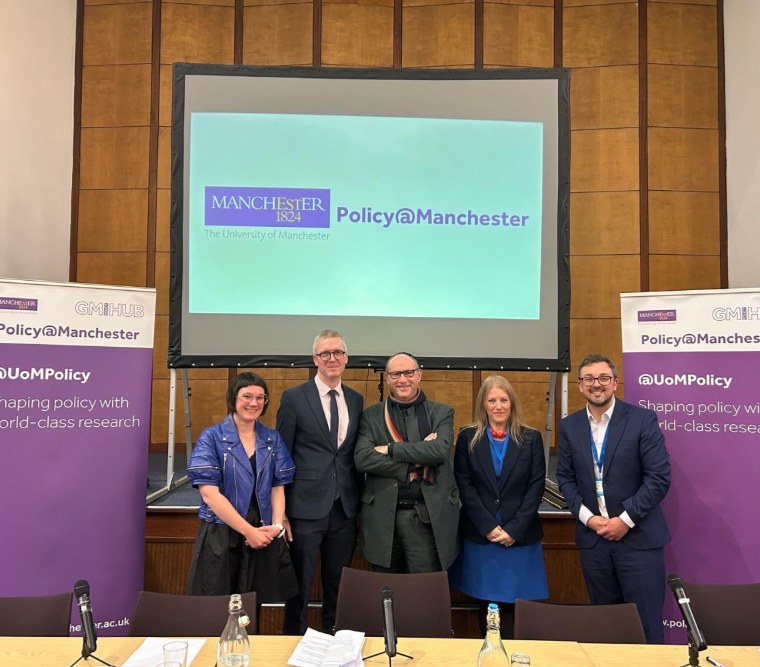
With announcements of even more cyber disruption hitting UK industry during our first panel, it felt extremely timely to welcome Professor Danny Dresner FCIIS to our next discussion, where he discussed some of the place-based initiatives to which assist SME's in Manchester in increasing their cyber security practices.
Working in partnership with like-minded institutions across the north-west, our research is changing the cyber security paradigm to one of safety and growth rather than fear. There are opportunities for lessons to be learned from the work happening at the local level that can be encouraged by central government. Greater Manchester had an established cyber ecosystem well before it became an indicator of success according to national strategy.
At both the Labour and Conservative events, panellists agreed on the need for joined-up policies, and a greater role for Government to play in securing the resilience of industry and infrastructure in an increasingly online world. Discussions also took place around the upcoming Cyber Resilience and Infrastructure Bill, expected to reach Parliament in the coming months. A massive thanks to all of our panellists for such an insightful discussion:
- Chair for Labour Antony Walker, Deputy CEO at techUK
- Chair for Conservative Matt Robinson, Head of Nations and Regions at techUK
- Lord Toby Harris, Chair at National Preparedness Commission
- Matthew Houlihan, Senior Director for Government Affairs at Cisco
- Verona Johnstone-Hulse, UK Head of Government Affairs at NCC Group
- Donna Jones, Police and Crime Commissioner for Hampshire and the Isle of Wight
- Katharina Sommer, Group Head of Government Affairs & Analyst Relations at NCC Group
Ending the postcode lottery: how to tackle health inequalities across the country
In partnership with Social Market Foundation
.jpg)
In the most deprived areas of the UK, life expectancy can vary by up to 18 years. Across all three conferences, we partnered with Social Market Foundation to deliver a panel event which explored the health outcomes, and how they vary by location, gender, ethnicity, quality of work, lifestyle, housing and income. We were delighted that two of our fantastic academics could contribute to this extremely important discussion - Academic Co-Director of Policy@Manchester, Professor Arpana Verma, and Healthier Futures at The University of Manchester's Research Fellow Dr Natalie Bennett.
Our panellists discussed the impact of health inequalities on economic growth, and explored some potential policy levers that are needed to address them. We are extremely grateful to Social Market Foundation's own Dr Rebecca Montacute for chairing our panels, alongside our fantastic range of panellists:
- Dame Clare Moriarty, Chief Executive at Citizens Advice
- Andrew George MP, Member of Health & Social Care Committee and Member of Parliament for St Ives
- Dr Luke Evans MP, Shadow Parliamentary Under Secretary (Health and Social Care)
- Alex Kenney, Head of Government and External Affairs at British Heart Foundation
- John Maingay, Director of Policy and Public Affairs at British Heart Foundation
- Tom Almond, Health Analytics Lead at British Heart Foundation
Quality Matters: Defending and enhancing the UK's global reputation for excellence in education
In partnership with Higher Education Policy Institute and supported by Cambridge University Press & Assessment
.jpg)
Professor Duncan Ivison joined the Higher Education Policy Institute team at Labour Party Conference, this time to discuss the implications of the way geopolitics in shaping the Higher Education sector. He drew on international comparisons within international higher education contexts, from US to South East Asia, and discussed ways in which the UK should seize opportunities to shine on the international stage:
We have a challenge to continually think about how we explain to the public the value of international education. In Canada and Australia, one of the things universities got wrong was misunderstanding or not anticipating the anxieties that communities begin to feel about transport, or housing, as international students started to arrive. That is a lesson we need to reflect on. Ask ourselves not only ‘are we providing the right kind of support?’, but ‘are we explaining to our communities how we’re bringing these students into the community in a reasonable, effective way.
The UK has a staggering, once-in-a generation opportunity to be seen as a beacon of reason, calm, tolerance and excellence in education. We as a sector have to ask ourselves: can we seize it?
Professor Ivison was delighted to be joined by an expert panel of speakers, our sincerest thanks to them all for such valuable contributions:
- Chair Nicholas Hillman, Director of Higher Education Policy Institute
- Daniel Zeichner MP, Member of Parliament for Cambridge
- Pamela Baxter, Chief Product Officer at Cambridge University Press & Assessment
- Chris Havergal, Editor at Times Higher Education
- Vivienne Stern MBE, Chief Executive at Universities UK
Our colleagues at The University of Cambridge have kindly compiled a fantastic write up of this event, to read more head over to their website.
How can universities best win back public support?
Event facilitated by Higher Education Policy Institute and supported by The University of Sussex and Goldsmiths, University of London
.jpg)
Professor Ivison once again joined the Higher Education Policy Institute team, this time at Conservative Party Conference, reflecting on how the public perception of higher education can change, highlighting the need to protect the reputation of universities from the perception of dysfunction, and further noting there is a risk is that universities find themselves associated with a general decrepitude which needs to be acknowledged. He also reflected on the immense opportunities - the position of the US system of higher education now, previously a place where the best and brightest in the world go to study and then start their businesses, is now being destroyed - creating a tremendous opportunity for the UK that we must take advantage of.
Duncan was also joined by Neil O'Brien MP, Shadow Minister for Policy Renewal and Development, who set out his support for higher education, whilst also warning about the unsustainability of writing off unpaid student debt, alongside concerns about low quality higher education provision.
A huge thanks to fellow Higher Education colleagues for their role in contributing to this important and timely discussion:
- Chair Nicholas Hillman, Director of Higher Education Policy Institute
- Professor Sasha Roseneil, Vice-Chancellor of The University of Sussex
- Professor Frances Corner OBE, Vice-Chancellor of Goldsmiths, University of London
Solving school absences: How can we get children back into school?
Event facilitated by Higher Education Policy Institute and supported by The University of Sussex and Goldsmiths, University of London
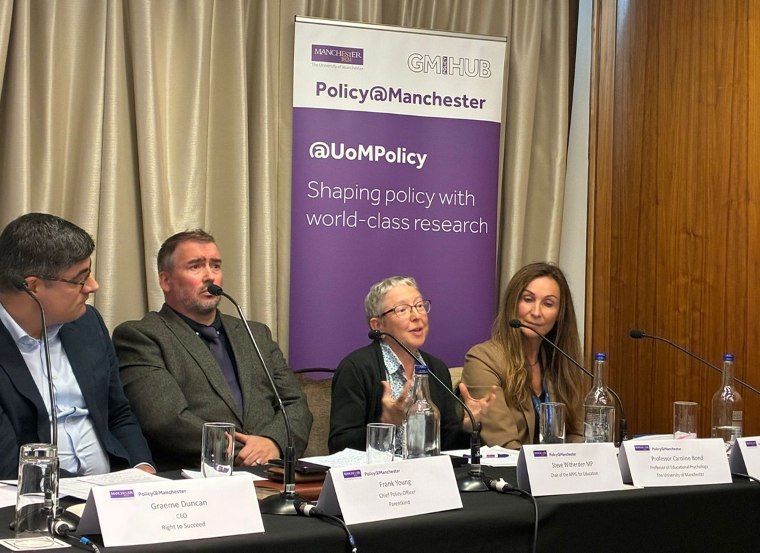
At Labour Party Conference, we showcased the brilliant research from Professor Caroline Bond from the School of Environment, Education and Development at The University of Manchester. Her work looks at the link between school absences and disadvantage in the UK:
Disadvantage is a significant factor in poorer educational and long-term life outcomes – and there are clear links between geographical inequalities and school absences.
Caroline was joined by an expert panel, contributing to an extremely worthwhile and important discussion:
- Chair Frank Young, Chief Policy Officer at Parentkind
- Steve Witherden MP, Chair of the APPG for Education
- Graeme Duncan, Chief Executive Officer at Right To Succeed
- Councillor Julie Reid, Executive Member for Early Years, Children and Young People at Manchester City Council
- Rachael Fidler, Schools Trust Leader at Dixons Academies Trust
In Conversation with Mayor Andy Burnham
In partnership with Centre for Cities
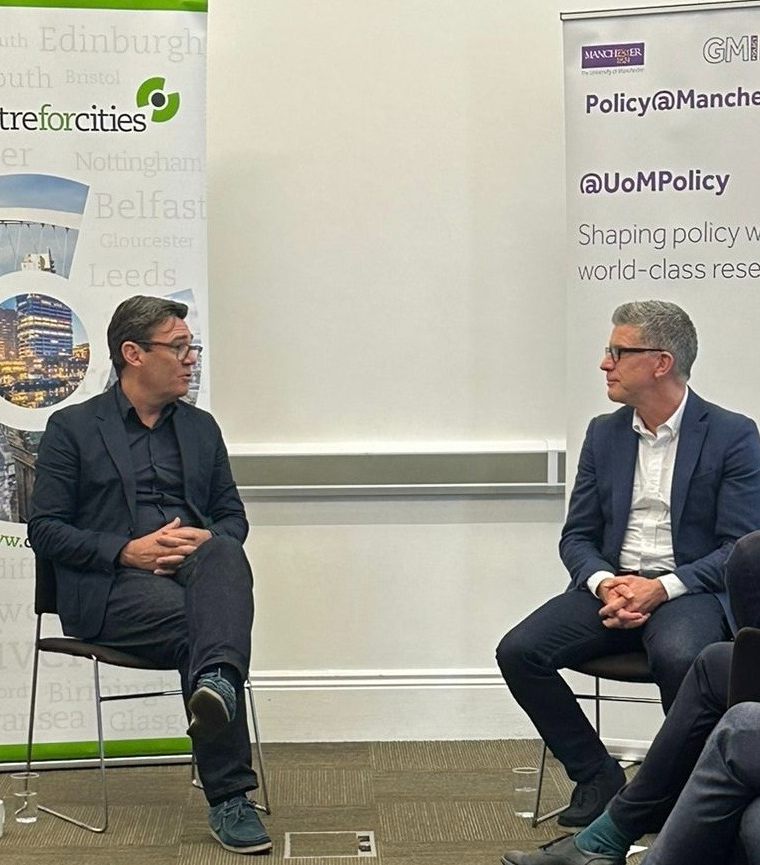
We were delighted to once again host an ‘In Conversation’ event at this years Conservative party Conference, and continue our partnership with Centre for Cities. During this event, Mayor of Greater Manchester Andy Burnham and Andrew Carter, Chief Executive for Centre for Cities, discussed the nuanced relationship between central and local government, again emphasising the need for greater devolution and a rethink about some of the financial barriers faced by local and mayoral authorities.
The conversation spanned from education – with the Mayor focussing on the government’s endorsement of the MBacc (the Greater Manchester Baccalaureate) – to housing, with Burnham outlining the case for more control over housing in his remit. He expressed his desire for Greater Manchester to accelerate on key policy areas – such as energy and housing – whilst remaining at the forefront of future technologies and innovation.
